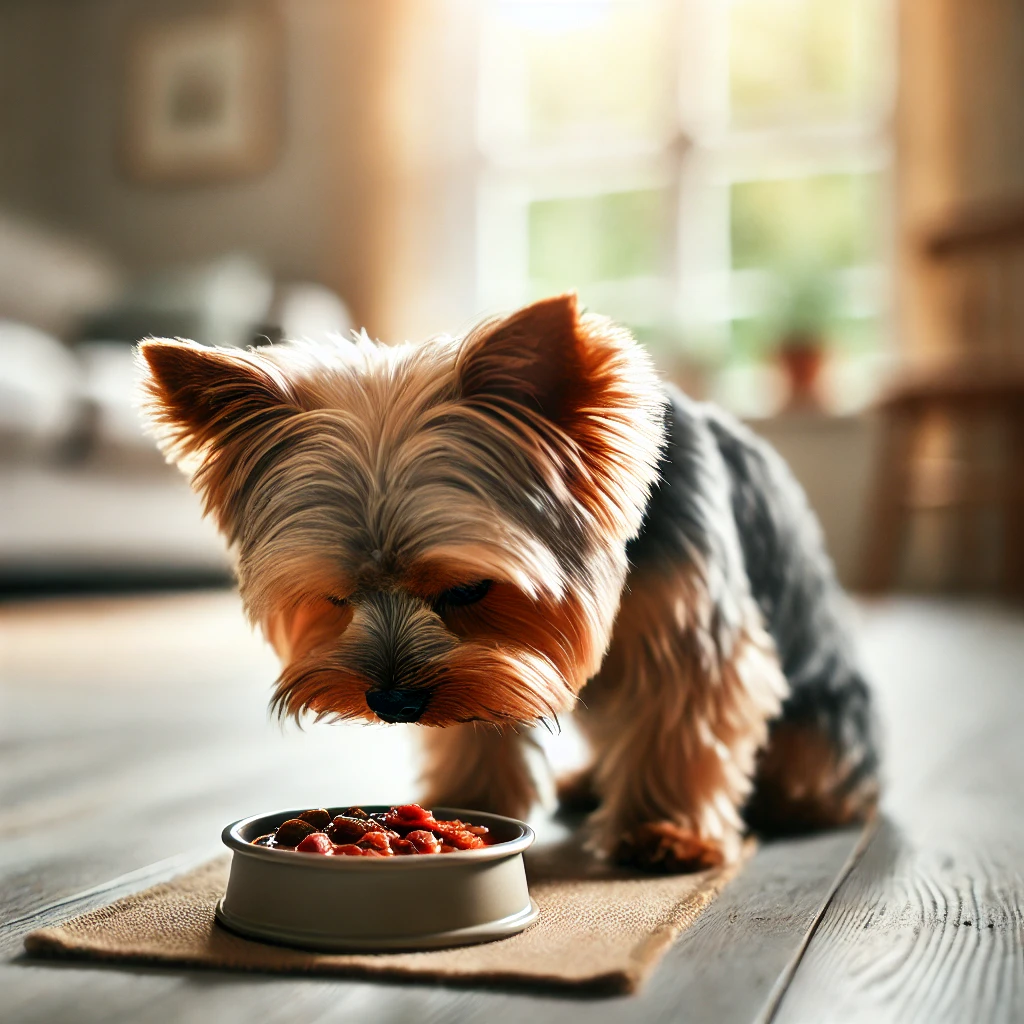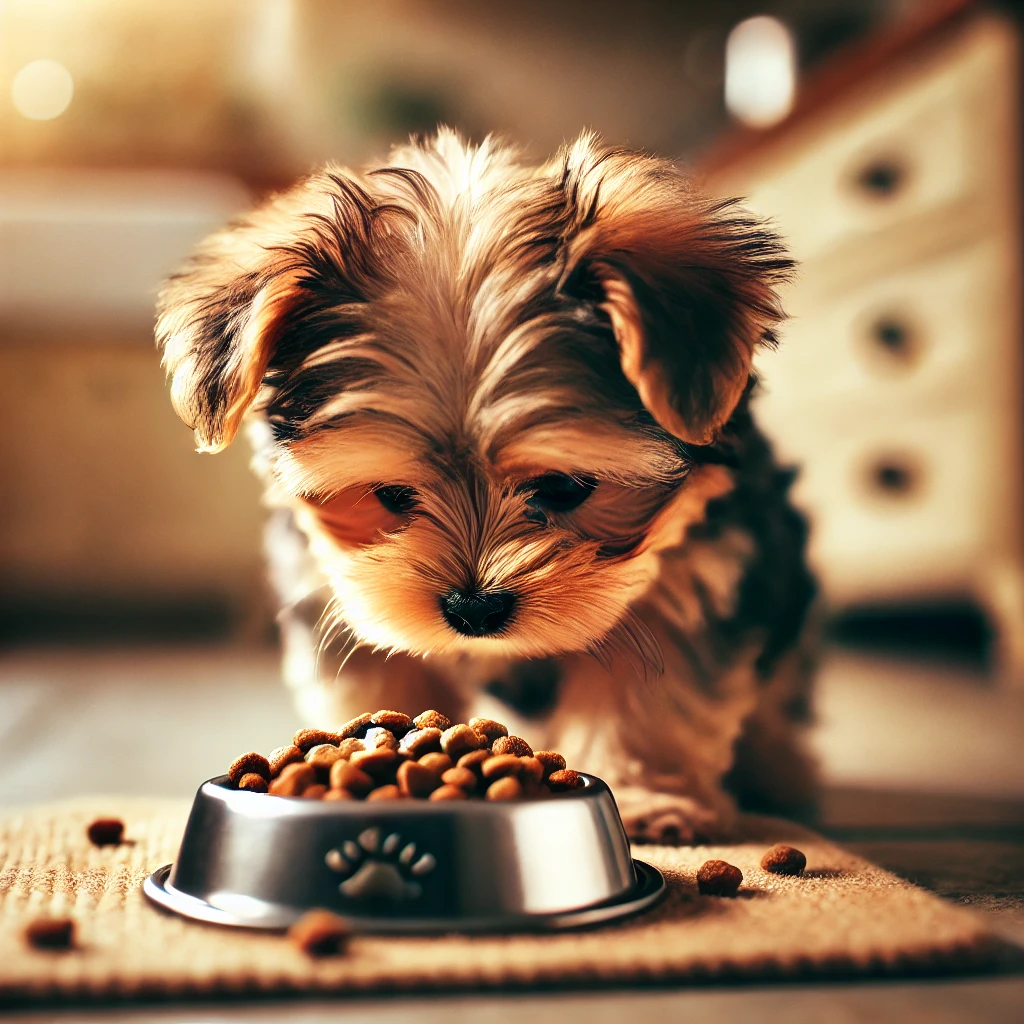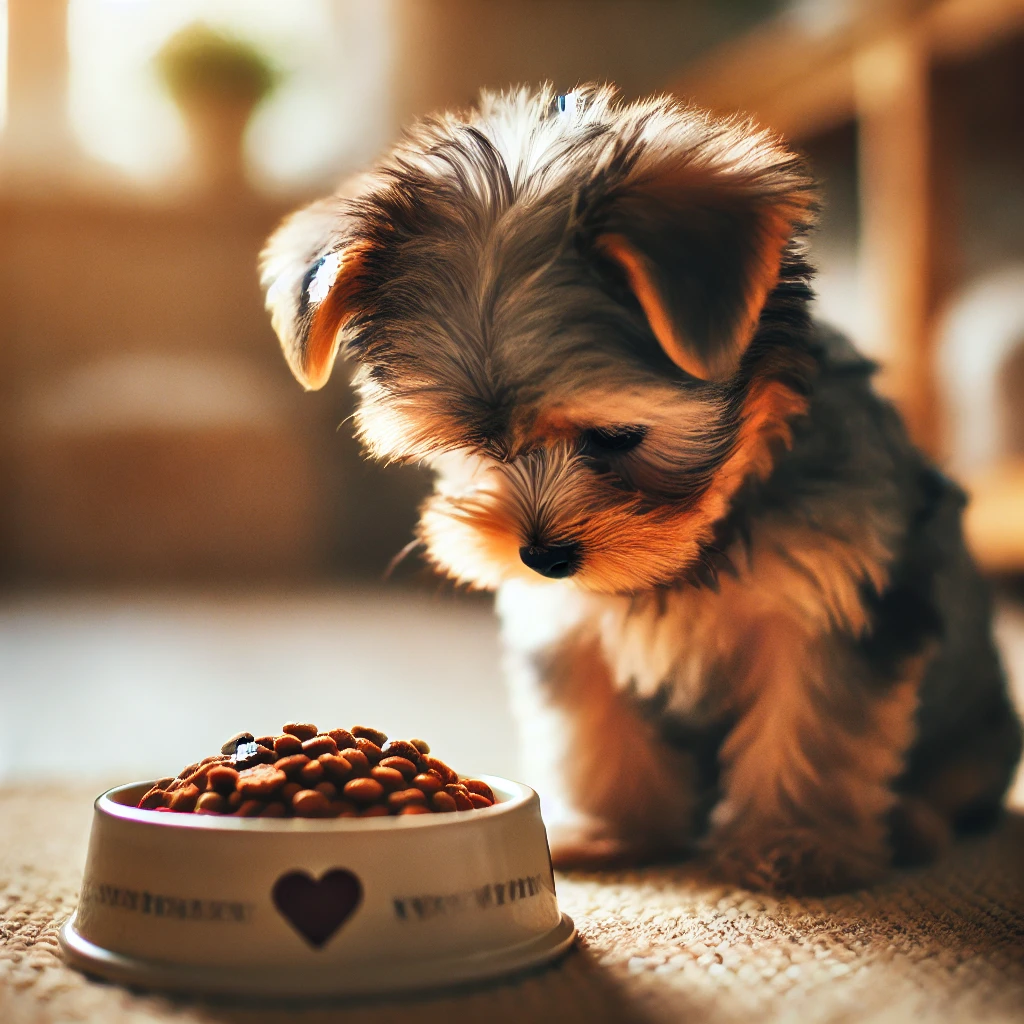Blog
What is the Best Food for a Yorkie Puppy? The Ultimate Guide

Choosing the right food for your Yorkie puppy is essential for their growth and health. With their tiny size and delicate digestive systems, Yorkies need specific nutrients to thrive. In this post, we’ll explore the best food for a Yorkie puppy, including dry kibble, wet food, and homemade options. We’ll also discuss foods to avoid, feeding amounts, and special needs like hair growth that is affected by food intake.

Understanding Your Yorkie Puppy’s Nutritional Needs
Yorkie puppies have unique dietary requirements because of their small stature and high energy levels. Here’s what to look for in the best puppy food for Yorkies:
- High-quality proteins for muscle development
- Healthy fats for energy and coat health
- Essential vitamins and minerals for overall health
- Small kibble size that is easy for them to chew
Now, let’s explore the different food types suitable for Yorkie puppies.
Best Dry Food for a Yorkie Puppy
Dry kibble is a popular choice for many dog owners because it helps maintain dental health by reducing plaque buildup. The best dry food for Yorkie puppies includes:
- Royal Canin Yorkshire Terrier Puppy: Specially formulated for Yorkies, this food contains DHA, Omega-3, and Omega-6 fatty acids for a healthy coat and skin.
- Wellness Complete Health Small Breed Puppy: Packed with high-quality proteins, whole grains, and fruits, this brand supports growth and development.
- Blue Buffalo Life Protection Formula: Made with real chicken and brown rice, this kibble is ideal for supporting muscle growth in active puppies.
Advantages of dry food:
- Convenient to store and serve
- Helps keep teeth clean
- Long shelf life
Disadvantages:
- May be too hard for some puppies with sensitive teeth
- Requires fresh water to keep your Yorkie hydrated
Best Wet Food for Yorkies
Wet food can be easier for young puppies to eat and digest due to its soft texture and high moisture content. The best wet food for Yorkies includes:
- Hill’s Science Diet Puppy Wet Dog Food: Made with high-quality protein from real chicken, it supports healthy growth.
- Merrick Grain-Free Puppy Plate Wet Dog Food: Features real deboned meat, fresh fruits, and vegetables, providing balanced nutrition.
Advantages of wet food:
- Easier to chew for young puppies
- Contains more moisture, which helps with hydration
Disadvantages:
- Shorter shelf life once opened
- Can be more expensive than dry food
Best Homemade Food for Yorkies
Homemade food allows you to control exactly what your puppy eats, making it possible to avoid fillers and allergens. Some options for best homemade food for Yorkies include:
- Cooked chicken or turkey with brown rice and vegetables (like carrots and peas)
- Scrambled eggs with sweet potatoes
- Lean beef with oatmeal and green beans
Advantages of homemade food:
- Control over ingredients
- Ability to cater to dietary restrictions
Disadvantages:
- Time-consuming to prepare
- Requires careful planning to ensure a balanced diet

Raw Food Diet for Yorkies
Some owners prefer feeding a raw food diet, believing it mimics what dogs would eat in the wild. It includes raw meats, bones, fruits, and vegetables. While this can be beneficial for coat health and energy levels, it must be done carefully to avoid bacterial contamination. The good side of a raw diet is that is free of artificial flavors, additives and all those low grade ingredients. Raw ingredients will support and improve your Yorkie’s skin, immunity, and overall digestive system. However, just like with any other diet, we recommend you to check with your vet all the details and information about including the precise amount of certain ingredients.
Bones can cause choking in your Yorkie, so you should also be very careful with including them to their diet.
Pros:
- High protein content for muscle development
- Natural ingredients
Cons:
- Risk of bacteria and parasites if not handled properly
- May not be suitable for puppies with sensitive stomachs.

Foods Yorkies Can Eat and Should Avoid
List of foods Yorkies can eat:
- Lean meats (chicken, turkey, beef)
- Fish (salmon, sardines)
- Eggs (make sure the eggs are fresh)
- Vegetables (carrots, peas, green beans)
- Fruits (blueberries, strawberries apple, – no seeds, and other fruits rich in antioxidants)
- Food rich in fiber should be included in small amounts
Yorkie foods to avoid:
- Chocolate: Contains theobromine, toxic to dogs.
- Grapes and raisins: Can cause kidney failure.
- Onions and garlic: Toxic to dogs and can lead to anemia.
- Xylitol: A sugar substitute found in some human foods that is extremely dangerous for dogs.
- Cheese: Because it’s rich in butter, lactose, and milk fat that can cause diarrhea.
How Much Should a Yorkie Eat?
The amount a Yorkie puppy should eat depends on their age:
- 8-12 weeks: Around ¼ to ½ cup of puppy food, divided into 4 meals per day.
- 3-6 months: ½ cup to ¾ cup of puppy food, divided into 3 meals per day.
- 6-12 months: ¾ cup to 1 cup of food, divided into 2 meals per day.
As Yorkies grow into adults, their diet will need to adjust. For a teacup Yorkie puppy, serving sizes may need to be slightly reduced due to their smaller size. Choose a smaller bowl for a teacup Yorkshire terrier because they require multiple smaller meals during a day.
Wet vs. Dry Food for Yorkies: Which is Better?
Owners often wonder, “Is wet or dry food better for Yorkies?” The answer depends on your puppy’s preferences and specific needs:
- Wet food is ideal for puppies who struggle to chew dry kibble or need extra hydration.
- Dry food can be a better long-term option for dental health.
A mix of both might work well, providing variety and nutritional balance.
Foods That Support Hair Growth in Yorkies
Yorkies are known for their beautiful, silky coats. To keep their hair shiny and healthy, feed them foods rich in Omega-3 and Omega-6 fatty acids, like salmon and flaxseed oil. Other nutrients like biotin and vitamin E are also essential for coat health. You can also include a complex of vitamins into your Yorkie’s diet to get the best results.
Recommended Brands for Yorkie Puppy Food
To help you find the best dog food for Yorkies, here are a few top brands to consider:
- Royal Canin Yorkshire Terrier Puppy (for breed-specific needs)
- Hill’s Science Diet Puppy Food (for balanced nutrition and optimal health)
- Blue Buffalo (for a grain-free option)

Feeding Tips for Yorkie Puppies at Different Life Stages
Yorkie puppies have changing dietary needs as they grow. Here’s how to adjust their feeding habits throughout different stages of life:
- 8-12 Weeks Old: Weaning Stage
- At this young age, puppies are still transitioning from their mother’s milk to solid food. Use a high-quality puppy formula food, moistened with water to make it easier for them to eat.
- Feed 4 small meals a day to keep their energy levels stable. Their stomachs are tiny, so frequent feeding is essential.
- 3-6 Months Old: Growth Stage
- During this stage, Yorkie puppies will be growing rapidly, and their calorie needs are higher. They should be eating 3 meals a day, with around ½ to ¾ cup of food divided among these meals.
- Continue using puppy-specific food with a balanced nutrient profile, including DHA for brain development and protein for muscle growth.
- 6-12 Months Old: Transition to Adult Food
- As your Yorkie approaches 12 months, you can begin the transition to adult dog food. The feeding frequency can also reduce to 2 meals per day.
- Look for small breed formulas designed for adult dogs to ensure the kibble size is appropriate for their small mouths.
- Over 12 Months: Adult Maintenance
- After one year, your Yorkie will need a consistent diet to maintain their health. Continue feeding them twice a day, with the amount adjusted based on their activity level and weight.
Special Considerations for Teacup Yorkie Puppies
Teacup Yorkies are even smaller than the standard Yorkie, typically weighing less than 4 pounds as adults. Due to their petite size, they have higher risks of hypoglycemia (low blood sugar). Here’s how to address their special needs:
- Frequent small meals (4-5 times a day) are essential to keep their blood sugar levels stable.
- Monitor their weight closely, as even a slight increase can significantly affect their health.
- Avoid foods that are too high in fat, as Teacup Yorkies are prone to obesity.
Yorkie Foods to Avoid
While there are many healthy options for Yorkie puppies, certain foods should be strictly avoided to prevent health issues:
- High-fat foods: While fat is a necessary nutrient, too much can lead to obesity and digestive issues.
- Sugary foods: Can contribute to tooth decay and weight gain.
- Artificial additives and preservatives: Found in some lower-quality dog foods, these can cause allergies and skin problems.
Should You Add Supplements to Your Yorkie’s Diet?
If your Yorkie is eating a balanced diet of high-quality dog food, they may not need additional supplements. However, certain supplements can benefit specific health concerns:
- Omega-3 and Omega-6 fatty acids: For coat health and to reduce inflammation.
- Glucosamine and chondroitin: For joint health, especially if your Yorkie is highly active or prone to joint issues.
- Biotin and vitamin E: For skin and coat maintenance.
Before starting any supplement, it’s best to consult with your veterinarian. You can add them to your dog’s meal or hide them inside their rewarding chews.
Transitioning Between Different Foods
When switching your Yorkie to a different food (whether from wet to dry, homemade, or a different brand), it’s important to do so gradually to avoid digestive upset. Follow this step-by-step guide:
- Day 1-3: Mix 25% of the new food with 75% of the current food.
- Day 4-6: Increase to a 50/50 mix.
- Day 7-9: Mix 75% new food with 25% of the old food.
- Day 10: Fully transition to the new food.
If your puppy shows signs of an upset stomach, such as diarrhea or vomiting, slow down the transition.
How to Encourage a Fussy Yorkie to Eat
Yorkies are known to be picky eaters. If your puppy seems uninterested in their food, try the following strategies:
- Warm the food slightly to enhance its aroma.
- Mix wet food with dry kibble to make it more appealing.
- Add a bit of low-sodium chicken broth to their food to boost flavor.
- Try rotating proteins, such as switching from chicken to lamb or beef.
Avoid feeding table scraps or human food, as it can encourage bad eating habits and may not provide the proper nutrition. Those foods can also trigger allergic reactions and intestinal problems, so you’d better escape giving them to your pet.

The Importance of Hydration for Yorkie Puppies
Whether you choose wet food, dry kibble, or homemade meals, ensuring that your Yorkie puppy stays hydrated is crucial. Here’s how to help:
- Provide fresh water at all times.
- If feeding primarily dry kibble, consider adding a bit of water or broth to their meals. Make sure the dry kibble doesn’t contain high percentage of corn, soy or some other type of carbohydrates. Your pooch needs enough meat to stay healthy and fit
- Monitor your Yorkie’s water intake—if they are not drinking enough, wet food might be a better option. However, note that these products often contain low percentage of meat proteins.
Best Food for Yorkies with Special Dietary Needs
Some Yorkies may have specific dietary requirements due to allergies or other health concerns. Here’s how to manage them:
- Food allergies: Look for limited ingredient diets with a novel protein source, such as duck or venison.
- Sensitive stomachs: Try easily digestible foods that contain probiotics for digestive health.
- Weight management: Choose lower-calorie foods and monitor portion sizes to prevent weight gain.
Conclusion: What is the Best Food for a Yorkie Puppy?
Finding the best food for a Yorkie puppy involves understanding their nutritional needs and exploring different types of dog food. High-quality dry kibble, wet food, and homemade meals can all be suitable options when chosen carefully. Whether you opt for a premium brand or prepare homemade meals, your Yorkie puppy will thrive when given a balanced diet with the right nutrients. Always consult your vet to ensure the diet meets your puppy’s needs and make changes gradually for the best results.
